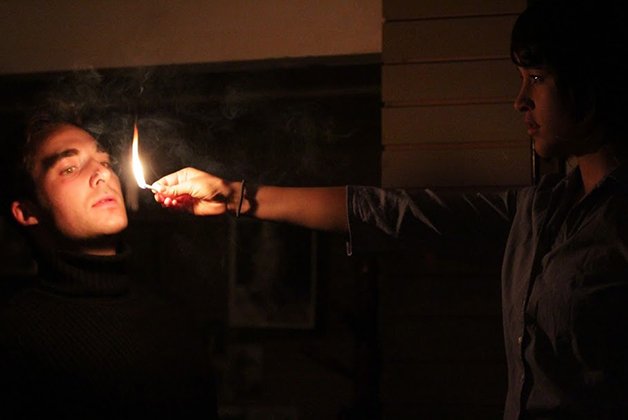
One of the best-known thrillers of the 1960s, Frederick Knott’s suspenseful Wait Until Dark – Audrey Hepburn starred in the film version – features a woman whose husband has unknowingly been given a doll filled with street drugs.
Now a ruthless, clever thief wants to get the heroin back, manipulating a couple of con artists to help him. He gets the husband out of the way, sends his accomplices into the couple’s apartment and plays various games to trick the wife. They figure it can’t be so hard – she’s blind.
Red One Theatre’s production opens the company’s StoreFront Theatre under Benjamin Blais’s direction.
Some elements work, others don’t.
It might seem strange to compliment Kelly Read’s Greenwich Village basement apartment set, but the design is crucial for a show that relies on a blend of the ordinary and the unexpected.
We have to care about the innocent characters – Suzy (Dayle McLeod), her photographer husband, Sam (Jonathan Widdifield) and their young upstairs neighbour, Gloria (Claire Armstrong) – but that caring is only sporadic.
Knott gives Sam little stage time to establish his presence, while the clearly adult Armstrong, rarely convincing, works too hard at making Gloria a wilful, frequently self-centred child.
McLeod’s Suzy, the centre of the show, has to be a sympathetic figure whose growing awareness of what’s happening makes her stronger and more likeable as the situation becomes more dangerous. That sympathy has to come from within, with character growth, but McLeod stays on the surface, relying on Suzy’s blindness to make us feel for her. The result is a bland performance.
The villains are a better crew, from the first scene in which Mike (David Tompa) and Carlino (Brenhan McKibben), distrustful former associates, try to scam each other. The stakes get higher with the appearance of Roat (Tyrone Savage), who forces them into an uncomfortable alliance to get the doll and the drugs. Those first few minutes are a great set-up for what follows, showing who’s in control.
Savage is the show’s standout, using a variety of disguises and voices to create a figure who speaks quietly most of the time but is always scary for the audience.
The last 20 minutes capture many of the script’s suspenseful jolts as the three baddies menace the now-aware Suzy with more performances, the actors will deliver the thrills even more smoothly.
See listing.
Remembering Patrick Conner
Friends and family will celebrate the life and work of theatre/film artist and organics activist Patrick Conner on Sunday (January 20).
The event begins at 2 pm at the Enoch Turner Schoolhouse (106 Trinity, near Parliament and King) with remembrances, some short performances and a reception. Later, starting at 6 pm, Buddies in Bad Times will open Tallulah’s Cabaret (12 Alexander) for further toasts to and shared memories of the much-loved Conner.
Next Stage succeeds
The sixth annual Next Stage Theatre Festival, produced by the Toronto Fringe at Factory Theatre, was a clear success.
Over 7,200 patrons purchased $77,000 in tickets over the 12-day event, with top sales going to Memorial, With Love And A Major Organ, The Peace Maker and the two Antechamber shows, Liza Live! and Pitch Blond.
Now it’s time to start dreaming about the regular Fringe, sure to be held in warmer weather, from July 3 to 14. And there’ll be a beer tent, too.
Generation gap
It’s always exciting to watch the mainstage debut of a young company, even if the material could still use some work.
Last weekend we caught Coyote Collective’s Like A Generation, the first show the group has presented outside of York University, where many of its members trained in the creative ensemble program and acting conservatory. The show closed on Saturday (January 12).
Like A Generation explores what it’s like to grow up focused on information and images presented through screens large and small: handheld devices, TV sets and others. What the characters need – and crave, though they don’t immediately realize it – is a more human, direct connection to others.
Devised by actors Susannah Mackay, Max Tepper and Eric Welch along with director Blue Bigwood-Mallin, with dramaturgy by the director and stage manager Madelyne Maingot, the show deals with isolation, commitment, grief and suppressed anger. The presentation, thanks to the engaging actors, is always watchable.
Each plays a “real” figure: a lonely charity worker who misses her childhood, an ignored guy who lives on the street, and another with parental problems.
Against a backdrop of TV sets, computer monitors and other such visuals that broadcast loops of TV shows, sounds, newscasts and ads, the three also take on other personas, characters in a bizarre TV show called Mr. Flowers. This larger-than-life trio includes a Batman type, a (sometimes) sexy ballerina and a hyper host who entices viewers to partake in their fantasy world.
The actors’ energy is strong – and at one point Mackay had a good ad lib when facing a wardrobe malfunction – but the show would be more memorable if the material were more inventive and less obvious.
stage@nowtoronto.com












